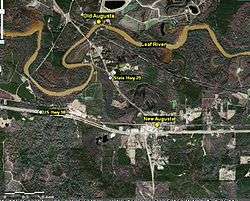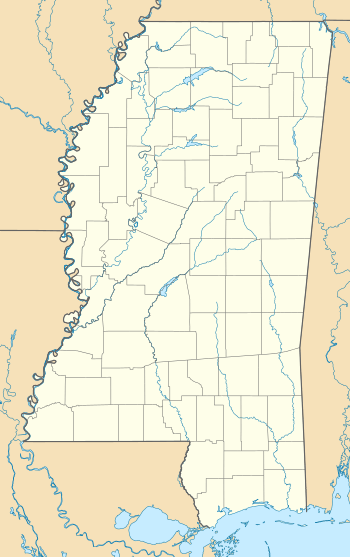Old Augusta Historic Site
The Old Augusta Historic Site contains the remnants of Augusta,[3] Mississippi, a town that was founded along the Leaf River in 1812 and abandoned between 1902 and 1906.[1] The site was added to the National Register of Historic Places in 1979 and was designated a Mississippi Landmark in 1999.
Old Augusta Historic Site | |
Mississippi Landmark
| |
 Aerial view of Historic Site | |
 Old Augusta Historic Site in Mississippi  Old Augusta Historic Site (the United States) | |
| Location | Perry County, Mississippi |
|---|---|
| Coordinates | 31°13′28″N 89°02′59″W |
| NRHP reference No. | 79001334 |
| USMS No. | 111-NAU-5001-NR-ML |
| Significant dates | |
| Added to NRHP | April 24, 1979[1] |
| Designated USMS | January 13, 1999[2] |
History
From 1818 until 1906, the town of Augusta served as the county seat for Perry County, Mississippi.[4][5] It was considered a major commercial and administrative center because a General Land Office was located there.[6]
In the 1850s, Augusta was the site for the trial and hanging of the outlaw James Copeland.[7] In the 1890s, Davis Hawthorne was hanged in Augusta for the murder of his wife.[1]
When the Mobile, Jackson, and Kansas City Railroad[8] was constructed 2 miles (3.2 km) south of Augusta, the town was moved to the railroad and developed as New Augusta.
Historic Site
When the site was evaluated for the National Register of Historic Places during the 1970s, it was determined that the town had been divided into three spatial units—a government district, a business district, and a residential district.[1] But there was little more than brick and concrete rubble where buildings had once stood, and the area had reverted to woodland.
References
- National Register of Historic Places Inventory—Nomination Form (Old Augusta Historic Site) Retrieved 2014-11-12
- "Mississippi Landmarks" (PDF). Mississippi Department of Archives and History. 2009. Archived from the original (PDF) on 2010-10-09. Retrieved 2014-01-12.
- Geographic Names Information System (Old Augusta, Mississippi) Retrieved 2014-11-12
- Dunbar Rowland (ed). 1907. Encyclopedia of Mississippi History: comprising sketches of counties, towns, events, institutions and persons (Volume I) Retrieved 2014-11-13
- Perry County Chancery Court—History of Perry County, Mississippi Retrieved 2014-11-13
- Land Patents in Mississippi, University of Southern Mississippi, McCain Library and Archives Retrieved 2014-11-13
- Pitts, J.R.S. 1874. Life and Bloody Career of the Executed Criminal, James Copeland. Pilot Publishing Co., Jackson, MS. (Available at Internet Archive ) Republished as: Pitts, J.R.S. 1909. Life and Confession of the Noted Outlaw James Copeland. (Available at Google Books ) Republished as: Pitts, J.R.S. and J.D.W. Guice. 1992. Life and Confession of the Noted Outlaw James Copeland. Jackson, MS: University Press of Mississippi.
- Mississippi Rails Retrieved 2014-11-15